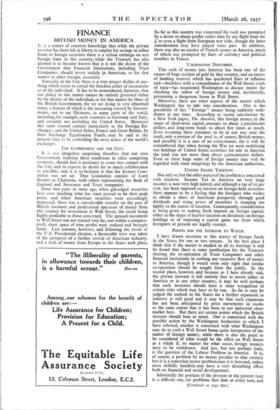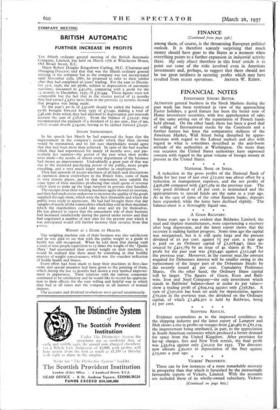BRITISH MONEY IN AMERICA
FINANCE
IT is a matter of common knowledge that while the private investor has been left at liberty to employ his savings in either home or foreign securities there is a virtual embargo on new foreign loans in this country, while the Treasury has also allowed it to become known that it is not the desire of the Government that Financial Institutions, including Trust Companies, should invest unduly in American, or for that matter in other foreign, securities.
Naturally in the City there is a very proper dislike of any- thing which seems to curtail the freedom either of institutions or of the individual. It has to be remembered, however, that our policy in this matter cannot be entirely governed either by the desires of the individual, or for that matter by those of the British Government, for we are living in very abnormal times, a feature of which is the increasing control by Govern- ments, not to say Dictators, in many parts of the world, including, for example, such countries as Germany and Italy, and certainly not excluding the United States. Moreover this same control extends particularly to the Foreign Ex- changes ; and the United States, France and Great Britain, by their Exchange Equalisation Funds, may be said at the present time to be controlling the most active of the world's exchanges.
THE GOVERNMENT AND ME CITY.
It is not altogether surprising therefore that our own 'Government, realising these conditions in other competing countries, should find it necessary to come into contact with the City and to express its desire for as much collaboration as possible; and it is to facilitate it that the Kennet Com- mittee was set up. That Committee consists of Lord Kennet as Chairman, with others representing the Bank of England and Insurance and Trust companies.
Some two years or more ago, when gilt-edged securities here were touching what has since proved to be their peak point, and when American securities were exceedingly depressed, there was a considerable transfer on the part of British investors and professional operators of money from this country for investment in Wall Street, the result being highly profitable to those concerned. The upward movement in Wall Street was not trusted very far, and within a compara- tively short space of time profits were realised and brought home. Last autumn, however, and following the result of the U.S. Presidential election, a favourable view was taken of the prospects of a further revival of American industry and a rush of money from Europe to the States took place So far as this country was concerned the rush was prompted by a desire to obtain profits rather than by any flight from the or even a flight from European war risks, though the latter consideration may have played some part. In addition, there was also an exodus of French money to America, much of which was prompted by fears of currency and political troubles in France.
WASHINGTON DISTURBED.
This rush of money into America has been one of the causes of huge receipts of gold by that country, and an excess of banking reserves which has quickened fears of inflation and—doubtless with a remembrance of the Wall Street crash of 1929—has occasioned Washington to discuss means for checking the inflow of foreign money and, incidentally, preventing a dangerous boom in Wall Street.
Moreover, there are other aspects of the matter which Washington has to take into consideration. One is the possibility of this " Foreign " money being suddenly with- drawn at any time. According to recent calculations by a New York paper, The Annalist, this foreign money, in the shape of short-term capital, amounts to about 1,500,000,000 dollars, and long-term funds to about five times as much. Even assuming these estimates to be in any way near the mark, only a portion of the total is, of course, British money, and possibly it is a case of an overestimate, for it will be remembered that when during the War we were mobilising our holdings of United States securities for sale to America the total was not more than about 5,000,000,000 dollars. Even so these huge sums of foreign money may well be regarded with some misgivings by the American authorities.
UNITED STATES TAXATION.
Not only so, but the other aspect of the problem is concerned with taxation. Income Tax in America on very large incomes is now very high indeed, and although a tax of ro per cent. has been imposed on interest on foreign-held securities there appears to be a feeling that the foreigner who wishes to obtain a share of American prosperity through good dividends and rising prices of securities is escaping too lightly in the matter of taxation. Consequently, consideration is being given to making fresh imposts on foreign capital, either in the shape of heavier taxation on dividends on foreign holdings or of imposing a capital gains tax from which foreigners at present are legally exempt.
• POINTS FOR ME INVESTOR TO WATCH.
I have drawn attention to this matter of foreign funds in the States for one or two reasons. In the first place I think that if the matter is studied in all its bearings it will be found that there is some justification for the Treasury desiring the co-operation of Trust Companies and other financial institutions in curbing any excessive flow of money to America, though it would seem only right that similar co-operation should be sought from the public. In the second place, however, and because, as I have already said, the private investor is left entirely free to invest either in America or in any other country, it may be well perhaps that such investors should have a clear recognition of certain risks which may have to be run. So far as may be judged the outlook in the States for a further expansion in industry is still good and it may be that such expansion has not been anticipated by price movements in stocks to the same extent that it has been in our industrial share market here. But there are certain points which the British investor should bear in mind. One is concerned with the possible action by the Washington Authorities to which I have referred, another is concerned with what Washington may do to curb a Wall Street boom quite irrespective of the matter of foreign money, while there is also the point to be considered of what would be the effect on Wall Street as a whole if, no matter for what cause, foreign moneys were to be withdrawn. And last, but not perhaps least, is the question of the Labour Problem in America. It is, of course, a problem by no means peculiar to that country but it is a somewhat newer problem than it is here and, unless most skilfully handled, may have a very disturbing effect both on financial and social developments.
Admittedly the position of the investor at the present time is a difficult one, for problems face him at every turn, and (Continued on page boo.)
FINANCE
(Continued from page 598.) among them, of course, is the threatening ,European political outlook. It is therefore scarcely surprising that much money should have gone to the States at a moment when everything points to a further expansion in industrial activity there. My only object therefore in this brief article is to point out some of the risks involved even in American investments and, perhaps, to suggest that there should not be too great tardiness in securing profits which may have
resulted from recent operations. ARTHUR W. KIDDY.











































 Previous page
Previous page